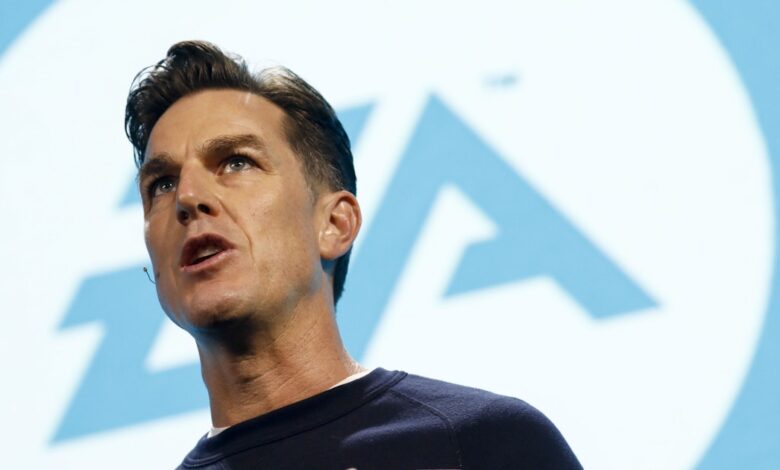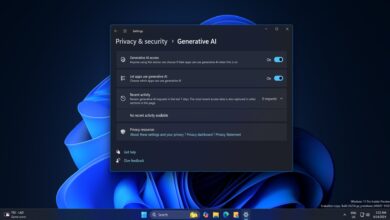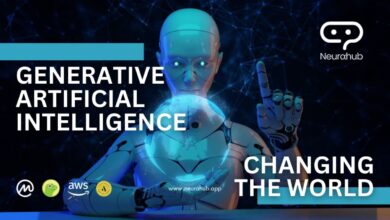Generative AI Is No Friend to Developers, No Matter What EA’s CEO Says

If there’s one thing we know about generative AI — a technology plagued by copyright violations that threatens to make creative jobs even less stable by flooding the market with cheap machine-generated sludge — it’s that game developers cannot wait to see more of it. At least, that’s the story that Andrew Wilson, CEO of EA, is telling. At a recent conference and a financial call, Wilson claims that generative AI could find its way into more than half of EA’s development processes and that its employees are eager to see it happen.
“We’ve done a study across all of the processes of game development,” Wilson said at the recent Morgan Stanley Technology, Media and Telecom Conference, livestreamed on EA’s website back in March. “About 60 percent of all of our processes have high feasibility to be possibly impacted by generative AI.”
EA increased the number of animations in its games by 100 times thanks to AI, according to Wilson.
EA
According to Wilson, injecting generative AI into its development cycle will help the company improve in terms of “efficiency, expansion, and transformation.” Wilson says AI has already helped cut down the time it takes EA to make a stadium for a sports sim from six months to six weeks (and claims that it could be reduced to just six days), and to scale up from dozens of animations per game to thousands. No word on how further growth is expected to impact employees, but the fact that EA had laid off more than 1,000 workers in the past two years could be a hint.
When it comes to transformation, there are even more questions left unanswered. Wilson says generative AI could allow players to create their own custom content for games and make EA “the beneficiaries of platform economics.” In other words, EA could make money off of a system that lets players generate their own content for games using AI in some yet-to-be-defined way. Again, this would seem to be disastrous for the people whose job it currently is to make that content, which makes Wilson’s follow-up statements during a financial call held in early May (reported by VGC) feel shockingly out of touch.
“There is a real hunger amongst our developers to get to this as quickly as possible,” Wilson said, “because the holy grail for us is to build bigger, more innovative, more creative, more fun games more quickly so that we can entertain more people around the world on a global basis at a faster rate.”
Wilson says AI could help developers make a stadium for EA’s games in just six days.
EA
While the “more, bigger, faster” philosophy may be exciting for investors, it’s hard to believe that many developers would be quite as eager to see it realized. Game development is a field already full of stories of crunch, burnout, and careers cut short. The idea that already overworked developers would jump at the chance to spend their days cleaning up mountains of AI-generated slop instead of continuing to craft games themselves is far-fetched to say the least.
There’s a good reason that artists have become increasingly outspoken against generative AI as its gained more popularity with game studio execs — because it’s taking away jobs. Voice actors rallied against Microsoft’s announced plans to use AI-generated NPCs last year, and every instance of generative AI actually making it into games, from High on Life to The Finals, is met with condemnation.
It can be easy to believe that AI is taking away jobs by doing the same work that artists and programmers could have done themselves, which isn’t really the case. Look at even the most impressive examples of generative AI in games and you’ll see it’s nowhere near ready to replace the work of actual humans. The problem is that generative AI doesn’t actually have to produce work as good as humans make, it just has to be good enough to convince publishers’ CEOs that people will buy it anyway.
Generative AI has already found its way into games like The Finals, stoking controversy.
Embark Studios
Another issue with generative AI is that it works not by creating, but by copying. A generative AI system has to be fed with enormous amounts of data — in the form of artwork taken from its creators without permission in many cases — in order to turn it into something new. There are multiple ongoing lawsuits against the AI companies fueling the technology. Wilson seems to have an answer for that, and it’s just as off-putting as the idea of AI taking people’s jobs.
“We do have 40 years of data,” Wilson said during EA’s financial call. “And so as I think about efficiency over one to three years, expansion over three to five years, transformation on a five-year time horizon, it’s actually very plausible that with 40 years of owned data that we have to feed into these models, we actually might be able to accelerate that time frame.”
The insinuation here is that EA could simply feed a generative AI model with information from its own 40-year history of making games. That means 40 years’ worth of work by EA employees could be used to create a generative AI monster, all without the people who made that work being consulted or even aware that it was happening. EA may have the right to do that as the owner of that work, but it makes it clear that all the company’s talk about this being the will of its developers is just for show.
For EA and other publishers, the dream isn’t that AI will make games better. It’s that AI will allow them to pay people a far lower wage to make AI’s droppings presentable than it would have to pay them to create a game themselves. As much as that may be good for shareholders wholly unconcerned with either workers or games, it’s hard to imagine that being an exciting prospect for people whose careers could be on the line.



